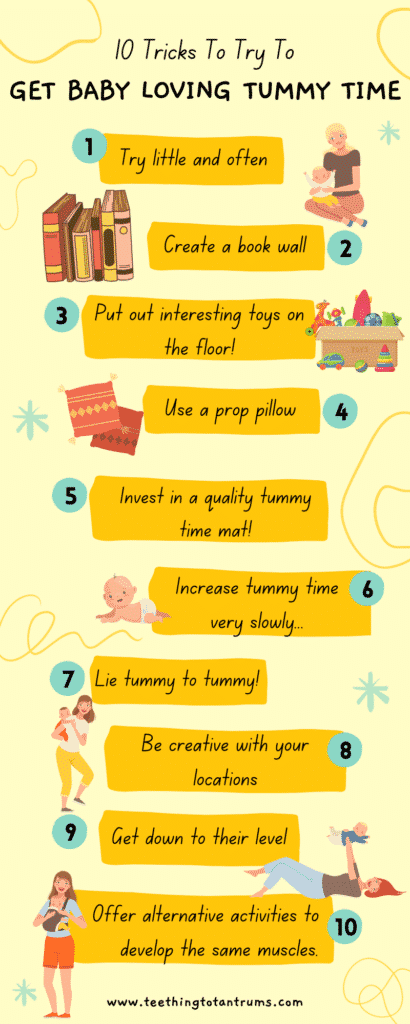So your baby hates tummy time? You’re not alone. While it’s a crucial exercise for building neck muscles, many babies simply hate it.
But fear not, in this article, we’ll share practical tips to make tummy time a fun and enjoyable part of your baby’s routine and alternative exercises for when you need them. Say goodbye to tears and hello to happy, healthy development.
Why Does My Baby Hate Tummy Time?
Some babies hate tummy time because they are not used to seeing the world from a different angle. They would much rather be looking up at the world from their back as it’s easier for them to see what is going on. Other babies find being on their front a little uncomfortable, especially if they’re lying down on a scratchy or hard surface, or haven’t been burped properly.
Why Is Tummy Time Important?
Tummy time is important for babies as it helps them develop strong neck and shoulder muscles, which are essential for head control and later skills such as sitting up, crawling, and walking.
It also helps prevent flat spots from forming on the back of a baby’s head, prevents conditions like positional torticollis (tight neck muscles) and promotes the healthy development of the spine and hips.
Tummy Time For Babies Who Hate It
As I just mentioned, the whole reason why we put our babies on their tummies is for them to strengthen their neck and shoulder muscles in preparation for rolling over, sitting and crawling.
And babies who spend more time practising these skills tend to do better later on as toddlers, so it’s really important that your baby gets plenty of practice during this stage of development.
Now, this article is an in-depth guide to helping babies who hate tummy time learn to love it.
However, if you prefer to watch videos instead of reading posts, here’s a quick video I made about tummy time and how to encourage even the fussiest babies to engage in tummy time and its alternative activities.
When To Start Tummy Time
Tummy time can start as early as a few days after birth, as long as the baby is healthy and supervised.
In the beginning, most babies can tolerate up to 3-5 minutes of time on their tummy a few times a day, depending on how well baby reacts to being placed face down… and then you can gradually increase to 20-30 minutes a day by the time they are 3-4 months of age.
Make sure that you pick a time in the day when your baby is not too tired as then you have more chance of them embracing the activity. And ensure that you never do tummy time after a feed… as your baby will be very uncomfortable.
Looking to get your little one to sleep quickly and effortlessly so they’re well rested to tackle tummy time activities? Check out my Bedtime and Nap Cheat Sheet and master the art of making daytime naps and bedtimes as seamless as possible.
A bedtime & nap cheat sheet so good your little one will ask you to put them to bed...
Laura Williams "This is a life saver! I'm so glad I downloaded your bedtime & nap cheat sheet. My little one actually asked me to put him to bed last night! Unbelievable! Thank you so much!"
Click Here For The FREE Cheat Sheet
10 Tricks To Try When Your Baby Hates Tummy Time
So now we know the basics of tummy time sessions, we can begin to address the issue of your baby not wanting to participate in this activity and turn it into a more enjoyable experience for you and your baby.
Here are my top 10 tummy time tips:

- Little and often is key. As I mentioned earlier, if your baby hates tummy time then make sure that you are introducing it little and often. A lot of short periods in the prone position several times a day will gradually get them used to looking at the world from this perspective.
- Create a book wall. Make tummy time interesting by making a wall of tummy time books for them to focus on. These books are ideal because they can be propped up to grab your baby’s interest and get them lifting their head and shoulders to build muscle tone.
- Have lots of toys on the floor. Putting lots of interesting tummy time toys on the floor around them when they are spending time on their tummy will distract them from feeling uncomfortable and motivate them to develop their fine and gross motor skills. Baby safe mirrors (like these) and soft toys are the ideal toys to start off with.
- Use a prop. Some babies find a tummy prop helps in the early days of tummy time. You can use a rolled-up towel, boppy pillow or blanket and put it under the chest with their arms out in front. Some babies also like lying on an exercise ball, but you will need to ensure you hold baby by the elbows to ensure they don’t fall off and hurt themselves.
- Get an activity gym or tummy time mat. Another great tip for when your baby has to spend time on their tummy is to place them on an activity or tummy time mat (like this one) Different textures and patterns to look at will help them get used to the prone position.
- Increase tummy time very slowly. If your baby is struggling with spending time on their tummy then build up the time spent on their belly gradually. Start with a minute or two a day and gradually increase to longer periods several times a day.
- Lie chest to chest. Laying your baby on your tummy can often help reluctant tummy timers as being in contact with you will make it easier for them to adjust to being in this position and help them feel safe and secure.
- Be creative with locations. Put your little one on their tummy whenever you can during normal daily activities. You can put them briefly on their tummy before or after you change their nappy. Or you can place them face down over your lap when you burp them or are wrapping them in a towel after a bath before bedtime.
- Get down to their level. Having you down on the floor with them will be a great motivator for your little one to lift their head and take a look around. Get down on your tummy, make eye contact and play together.
- If your baby is truly hating being on their tummy and none of the above tricks has helped, you can offer them alternative activities to help them develop the same muscles. These activities include:
- Holding your baby in an upright position against your chest and supporting their neck gently. This will allow them to gaze at the world from the comfort of your arms.
- You can also lay them across your lap when you are burping them or even carry your baby in the face-down position along your arm (with legs dangling on either side) when you are walking around the room to let them look around and develop their neck muscles.
NOTE: The American Academy of Pediatrics recommends that babies begin tummy time the very day they come home from the hospital to start building their upper body strength from day 1.
Frequently Asked Questions About When Baby Hates Tummy Time
Looking for more information about why baby hates tummy time and what to do about it? Here are the most common questions answered.
My Baby Hates Tummy Time And Is Getting A Flat Head. What Do I Do?
If you notice your baby is developing a flat spot on their head, there are several things you can do.
Of course, time on their tummy is the natural opposite of being on their back, however, if your baby really hates tummy time, you will need alternative positions to place them in. Therefore, you can engage your baby in face-to-face time.
Face-to-face time is as important as tummy time and it will help your baby to develop their neck strength. Support your baby in front of you, face-to-face and engage in direct eye contact.
If they are happy and settled they will follow your eyes to the side and while keeping eye contact, they will turn their head to see you.
TOP TIP: You can also help to help to reduce flat head syndrome by changing the position of your baby’s head while they sleep and varying the left or right positions they lie down in (still on their back to reduce Sudden Infant Death Syndrome, of course).
What Happens If I Don’t Do Tummy Time With Baby?
If you decide not to let your baby have tummy time it may slow the progress of their developmental milestones with regards to rolling, sitting and crawling.
We have to remember that before it was realised that infants are safer sleeping on their backs, babies spent a lot of time on their tummies. So, now we have to make special time for them to develop the muscles necessary for their natural physical development and to avoid flat head syndrome.
The developmental benefits of engaging in a tummy time activity will make sure your baby reached key milestones quickly and in a healthy way.
Is It OK For Baby To Cry During Tummy Time?
It’s common for babies to cry or fuss during tummy time, especially in the beginning when they are not used to being in that position. However, it’s important to make sure that your baby is not in pain or discomfort and to monitor their breathing and overall well-being.
If your baby is upset, try to distract them with toys, songs, or your voice, and gradually increase the duration and frequency of tummy time over time. If the baby continues to cry or seems uncomfortable, it’s best to stop and try again later.
Is There Such A Thing As Too Much Tummy Time?
While tummy time is important for a baby’s development, it’s also important not to overdo it.
As a general rule of thumb, babies should have supervised tummy time for short periods throughout the day, gradually increasing the duration and frequency as they get stronger.
However, if a baby is crying excessively or seems uncomfortable during tummy time, stop and try again later. It’s also important to give the baby plenty of time on their back and in other positions to avoid putting too much pressure on any one area of the body.
Need More Parenting Help?
- Download our FREE Bedtime & Nap Sleep Cheat Sheet. It’s a free, easy-to-use and proven formula designed for parents of 0-5 year olds to master the art of consistently undisturbed and restful sleep without the yelling, nagging or exhausting long-winded evenings.
- Check out our Parenting Toolbox. You’ll get access to expertly-chosen products that you can guarantee are the best for your little one and your wallet.
- Are you looking for personalized guidance to navigate the challenges of parenting? I offer 1-on-1 consultations to bring you tailored strategies and actionable advice to help support your child's growth and well-being with confidence.

A bedtime & nap cheat sheet so good your little one will ask you to put them to bed...
Laura Williams "This is a life saver! I'm so glad I downloaded your bedtime & nap cheat sheet. My little one actually asked me to put him to bed last night! Unbelievable! Thank you so much!"
Click Here For The FREE Cheat Sheet


